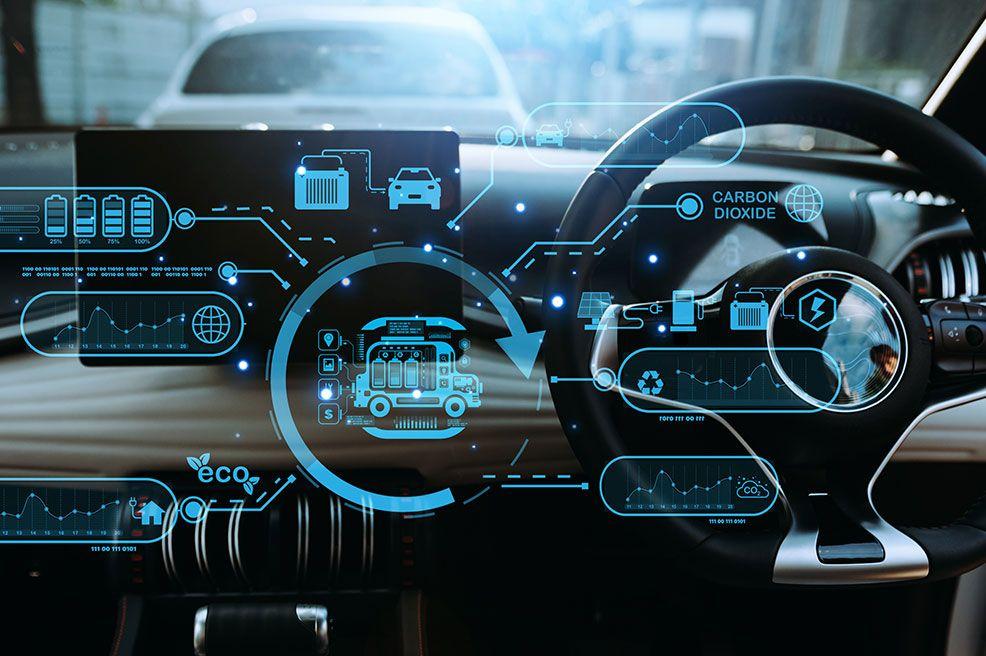
Big data and analytics impact on the automotive industry
- Big data is the new fuel driving innovation in the automotive industry, shaping the vehicle life cycle and industry trends. Through IoT technology, connected cars generate vast amounts of data, enabling predictive maintenance, increased safety, and personalized driving experiences;
- Predictive maintenance and vehicle reliability are significantly enhanced through big data analysis, allowing automakers to optimize technology and improve performance. On-board sensors revolutionize the industry by enabling efficient and reliable driving experiences;
- Big data facilitates enhanced safety by identifying potential hazards and improving safety features through advanced analytics. Insights from data analysis enable proactive safety measures, potentially preventing accidents and injuries;
- Analytics-driven insights also enhance fuel efficiency, navigation systems, and driver assistance features, offering real-time updates and personalized driving experiences. Understanding consumer preferences, building loyalty, and optimizing the supply chain are key benefits of big data in the automotive industry.
What impact does big data have on the automotive industry? This topic opens a conversation where technology and transportation converge to create innovations in safety, efficiency, and personalization. Moreover, this synergy accelerates the development of connected cars, which will redefine the driver experience.
At MakoLab, we have experience in designing connected vehicle solutions that are based on data analysis. We proved this when designing Connected, Autonomous, Shared and Electric (CASE) for premium German OEMs.
In this article, we will briefly but succinctly discuss the topic of big data and analytics in the automotive industry - more precisely, how data sets shape the vehicle life cycle and how they shape industry trends.

New fuel in the automotive industry: data
The use of big data to advance the automotive industry is the new fuel. As cars become more and more connected thanks to IoT technology, they generate huge amounts of data. Automotive companies use this data to gain a competitive advantage in the automotive sector. Sounds like a marketing cliche? Competitiveness is the key to innovation, because it is thanks to engineering that it increases the safety of drivers and passengers, provides predictive maintenance (prevents equipment failures), and allows for the personalization of the driving experience. Let's look at what the data is needed for step by step because the idea of connected cars is no longer a distant future concept – it’s here now.
Predictive maintenance and vehicle reliability
Imagine if your car could predict its own mechanical issues and prevent component failures before they become a problem. Additionally, such a car could be optimized with a maintenance schedule. All this could provide automakers with big data to improve technology and increase vehicle performance and reliability. Sounds good? Thanks to the analysis of large data sets, this is slowly becoming a reality and standard. On-board sensors are revolutionizing the automotive industry and paving the way for more efficient and reliable driving. The role of analytics in the automotive sector is crucial to this transformation.
Enhanced safety through data analysis
Big data isn’t just about efficiency – it’s also about safety. Automotive companies’ ability to identify potential hazards, improve vehicle safety features, and predict maintenance needs is facilitated by big data analysis of automotive industry big data from various sources. As they collect data, these insights become increasingly valuable for the automotive industry. For example, methods based on surrogate safety measures allow for proactive analysis of road safety before collisions occur. This enables safety improvements to be implemented before accidents happen, potentially preventing injuries and property damage.

Monitoring engine performance and fuel consumption
Data analysis has a significant impact on fuel consumption in smart cars. These vehicles are equipped with advanced systems that collect and analyse data on driving style, road conditions and weather forecasts to optimize fuel efficiency – minimize fuel consumption and reduce greenhouse gas emissions. Smart car manufacturers can also use data analytics to continually improve car design and performance, leading to further reductions in fuel consumption over time.
Enhancing navigation systems and driver assistance
Navigation systems have come a long way from merely pointing drivers in the right direction. Assisted by big data, these systems have improved in accuracy and effectiveness, and now provide real-time traffic updates, alternative routes, and even predictive maintenance alerts. Similarly, data is powering advanced driver assistance systems, improving safety and operational efficiency on the road.
Creating personalized driving experience
In addition to predictive maintenance and safety, big data also paves the way for personalized driving experiences. Automakers can now tailor the in-car experience based on individual driver behaviour and preferences. Here are some examples of personalized driving experiences:
- adjusting vehicle performance to match driver style;
- offering personalized services, such as recommendations for nearby restaurants or gas stations;
- customizing the in-car entertainment system based on driver preferences;
- Providing real-time traffic updates and alternative route suggestions based on driving patterns.
Vehicles are feeling more like an extension of drivers than ever before, thanks to big data, which allows for pre-configured settings like temperature and seat adjustments and personalized infotainment systems.

Analytics and customer experience
In a car manufacturing as competitive as the automotive industry, a customer-centric approach is key to success. Auto manufacturers are using analytics to:
- identifying consumer preferences. Examining factors such as customer demographics, purchasing history and service behaviour, and the journey they take to purchase a service or good allows manufacturers to identify the features in vehicles that consumers desire. Tailoring offer to the clients needs and desires are key to success;
- build customer loyalty by branding. In the context of UX in in-car design, we wrote about emotions. This is an integral element of building loyalty among customers, and nothing does this better than a personalized experience. Therefore, manufacturers should use data analysis to create personalized marketing strategies and targeted advertising campaigns that enhance customer engagement and loyalty;
- garner insights from driver feedback. No one knows a car better than the person behind the wheel. That’s why driver feedback is invaluable to car manufacturers. Analysis of this feedback enables manufacturers to identify areas for improvement, make informed decisions, and produce vehicles that not only meet but also exceed driver expectations.
Big data in the automotive supply chain
Big data plays a key role in optimizing the automotive supply chain. By taking advantage of the opportunities offered by multi-scale data analysis, various types of data and real-time processing, companies can increase the efficiency and effectiveness of their operations. This, in turn, leads to faster, more efficient and cost-effective transport of materials, which ultimately improves the entire production and transport process.
Moreover, by collecting and analysing data regarding, for example, the performance of employees and production line equipment, companies can identify areas requiring improvement and increased production efficiency. Sensors on production equipment provide valuable information such as temperature, humidity, workload and production efficiency, enabling timely optimization and maintenance to prevent equipment failure. Companies can plan maintenance activities more effectively by using historical maintenance data - this can reduce downtime and minimize risk to the enterprise.
Summary
Without a doubt, big data and analytics have drastically changed the automotive industry and led to innovations in safety, efficiency and personalization. Thanks to the company's competitiveness, the company enhances safety and provides predictive maintenance, which significantly affects the number of breakdowns and accidents and contributes to improving safety in future car models.
The convergence of technology and transportation has also accelerated the development of connected cars, transforming the driver experience. This data-driven approach to driver experience has led to improvements in vehicle reliability, safety features, fuel efficiency, navigation systems and driver assistance systems.
Moreover, big data has played a key role in understanding consumer preferences, building customer loyalty and optimizing the automotive supply chain, ultimately leading to more efficient and profitable operations.
Frequently Asked Questions (FAQ)
What is big data analytics in the automotive industry?
Big data analytics in the automotive industry helps manufacturers optimize supply chains, predict demand, and improve production efficiency, ultimately leading to better delivery times for customers.
How does data analytics affect the automotive industry?
Data analytics in the automotive industry helps manage the supply chain by providing real-time insights into supply and demand from multiple sources, allowing businesses to monitor trends and stay ahead of the competition.
What is the role of a data analyst in the automotive industry?
Data analysts in the automotive industry play a key role in enhancing customer engagement, reducing costs, designing reliable cars, improving customer retention rates, and adapting to a competitive market. They gather, analyse, interpret, and research data to support various initiatives within the industry.
What role does big data play in the automotive supply chain?
Big data optimizes operations in the automotive supply chain, including inventory, production, and quality management, while also helping companies navigate disruptions.
How is data transforming the driving experience?
Data is transforming the driving experience by enabling manufacturers to customize vehicle performance and offer personalized services based on individual driving preferences and habits. This means that driving experiences are becoming more tailored and personalized, enhancing the overall experience for drivers.
References
- Wikipedia, Predictive maintenance
- Nathaniel Edelmann, Mandar Khanal, Application of Connected Vehicle Data to Assess Safety on Roadways, Eng 4(1)
- Campos-Ferreira AE, Lozoya-Santos JJ, Tudon-Martinez JC, Mendoza RAR, Vargas-Martínez A, Morales-Menendez R, Lozano D., Vehicle and Driver Monitoring System Using On-Board and Remote Sensors, Sensors (Basel) 23(2), January 2023
- Mohammed Numeir, Advanced Driver Assistance System(ADAS)- An Overview, Medium
- Jiejing Gao, Big Data Analysis for Supply Chain Management in Vehicle Industry, Business &Management 34, December 2022

Katarzyna Warmuz
Content Marketing Specialist




